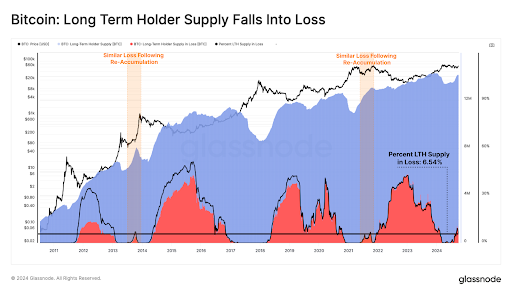The Bitcoin price action in the past two weeks has reiterated its volatile nature despite the steady flow of institutional money. The cryptocurrency surged in the last days of September from $53,500 to a high of $66,000, only to pull back to $61,000 in the first few days of October, showing its unpredictable nature.
Interestingly, Bitcoin’s rally to reaching $66,000 has led to a change in the investing dynamics among holder cohorts. Furthermore, this change in dynamics reveals that its reversal and retest after the rally is not entirely bad news for Bitcoin’s price. In fact, this shift suggests that the pullback could be setting the stage for a more resilient long-term price outlook for Bitcoin.
Bitcoin’s Rejection At $66,000
Bitcoin’s recent break above $66,000 last week led to the creation of the first higher high since June. This notable Bitcoin development was noted by on-chain analytics platform Glassnode in a recent report. Bitcoin, which had initially created a higher low of $53,000 in September, eventually went on to break above the August high of $64,500. According to the report, the creation of this higher high led to a change in the profitability of short-term and long-term holder cohorts, with many more bitcoins moving into the long-term threshold.

Particularly, the recent rally has seen many coins acquired in close proximity to the $73,780 all-time high now being held for over 155 days. This, in turn, has seen many of these coins, which are in losses, now moving to long-term holder status. Although only 6.54% of long-term holders are in losses, they account for 47.4% of all coins in losses. While this might not bode well at the moment for these long-term holders, Glassnode notes that this is actually common during re-accumulation phases, as seen in the 2013, 2019 and 2021 periods. History shows that these have often led to price rallies.

On the other end, profitability has improved massively among short-term holders. Glassnode data shows that a significant number of coins that are still in the short-term cohort have a cost basis between $53,000 and $66,000. Interestingly, the last rally has pushed the profitability of short-term holder supply to over 62%. Notably, profit-taking volumes are now 14.17 times larger than for loss-taking. As such, the financial pressure on short-term holders has now been eased, and many of them now have incentives to keep holding.
What Next For Bitcoin?
Despite Bitcoin’s recent reversal at $66,000, the cryptocurrency finds itself in a stronger and more profitable position for investors around the board compared to where it stood just a month ago. Furthermore, the rejection at $66,000 has given investors, especially long-term holders, another chance to load up on their holdings.
At the time of writing, Bitcoin is trading at $61,200.







